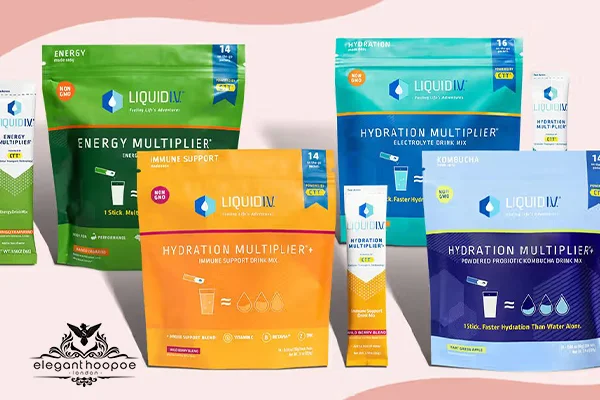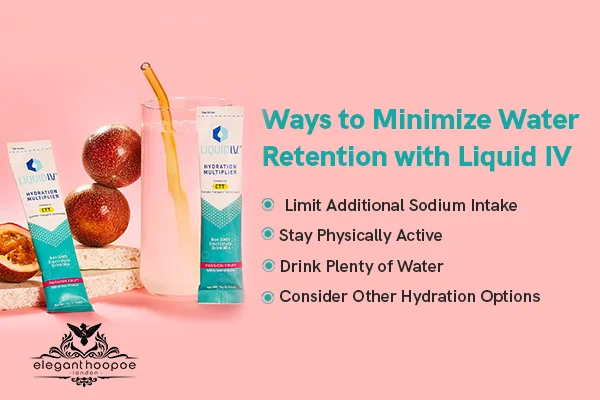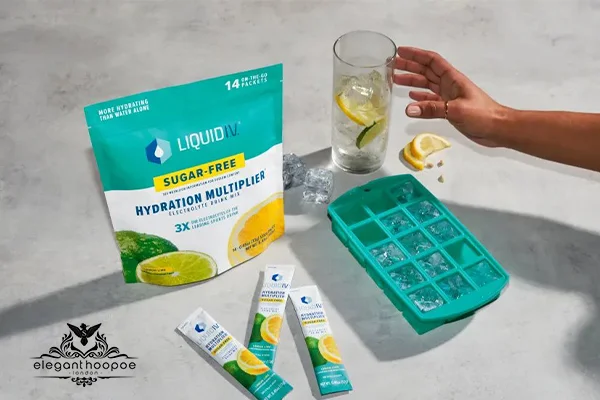Does Liquid IV Make You Gain Weight from Water Retention?
As hydration solutions like Liquid IV continue to gain popularity for their convenience and electrolyte-rich benefits, some people wonder if these drinks may cause water retention. After all, water retention, or edema, can be an uncomfortable experience, leading to swelling, bloating, and even health complications. If you’re considering Liquid IV for hydration or recovery, it’s essential to understand how it impacts your body’s water balance. So does liquid IV make you gain weight? In this article, we’ll explore what Liquid IV is, how it works, the potential for water retention, and who might be most at risk.
How Does Liquid IV Affect Hydration?

Liquid IV is designed to maximize hydration through what’s known as Cellular Transport Technology (CTT). The product’s combination of electrolytes and glucose accelerates water absorption in the intestines, allowing cells to access fluids faster. This rapid rehydration method can be especially beneficial for people who are dehydrated due to illness, exercise, or high heat exposure. However, increased hydration could potentially lead to water retention, particularly in individuals sensitive to electrolyte imbalances.
Related article: What is an IV drip used for
Can Liquid IV Cause Water Retention?

Water retention from Liquid IV isn’t common but can occur, particularly for individuals sensitive to sodium intake or those with existing health conditions. Since Liquid IV contains a higher concentration of sodium, it’s important to understand how this mineral affects your body’s water balance:
Sodium’s Role in Water Retention
Sodium is essential for various bodily functions, including fluid balance, muscle contractions, and nerve function. However, an excess of sodium can cause the body to retain water, especially if it exceeds your daily needs. Liquid IV has about 500mg of sodium per serving, which may contribute to water retention if you’re consuming other high-sodium foods or drinks. For people with healthy sodium levels, this isn’t usually a concern. However, those with salt-sensitive conditions, such as hypertension or kidney disease, may experience swelling or bloating from the additional sodium.
Individual Sensitivities and Health Conditions
So to answer your question, “Does liquid IV make you gain weight?”, first you should know it’s possible, but it also highly depends on your body. People with certain health issues might be more prone to water retention when using products like Liquid IV. Conditions like heart disease, kidney disease, or hormonal imbalances can make your body retain water more readily. If you have any of these conditions, it’s best to consult a healthcare provider before incorporating Liquid IV or any other high-sodium supplements into your routine.
If you are looking for IV therapy in Dubai, Elegant Hoopoe is the best choice.
How Much Liquid IV Is Safe to Consume?
For most people, a single serving of Liquid IV per day is adequate to meet their hydration needs without risking water retention. Overuse can increase your sodium intake significantly, potentially causing fluid buildup. If you find yourself using multiple servings of Liquid IV throughout the day, it’s wise to monitor for signs of water retention, such as swelling in the hands, feet, or face, and reduce your intake accordingly.

Ways to Minimize Water Retention with Liquid IV

If you enjoy the hydration benefits of Liquid IV but are concerned about water retention, there are a few ways to reduce your risk:
- Limit Additional Sodium Intake: Since Liquid IV already contains sodium, try to limit other high-sodium foods and drinks in your diet. This balance can help prevent excessive sodium levels, reducing the risk of water retention.
- Stay Physically Active: Regular movement encourages blood flow and helps prevent fluid from pooling in specific areas of the body.
- Drink Plenty of Water: Even though Liquid IV is a hydration supplement, it’s essential to stay well-hydrated with regular water intake throughout the day, which can help flush out excess sodium and reduce bloating.
- Consider Other Hydration Options: If water retention remains an issue, consider lower-sodium hydration options or natural alternatives like coconut water, which provides hydration without as much sodium.
Who Should Avoid Using Liquid IV?
While Liquid IV is generally safe for most people, certain groups should exercise caution. But who shouldn’t get IV therapies? Individuals with kidney disease, congestive heart failure, or high blood pressure should avoid high-sodium supplements, including Liquid IV, without a doctor’s approval. Similarly, if you’re already on a sodium-restricted diet, you may want to consult a specialist before adding Liquid IV to your routine to avoid potential complications.
Conclusion
So does liquid IV make you gain weight or not? To sum up, while Liquid IV is a powerful hydration solution that leverages electrolytes to support quick absorption, it does contain sodium, which might lead to water retention in some individuals. For most people, a balanced diet and proper dosage make Liquid IV safe to use without significant water retention issues. However, if you’re prone to sodium sensitivity or have a related health condition, monitoring your intake and consulting a specialist can make a difference in your experience.
For those interested in a tailored approach to hydration, speaking with a professional can provide valuable insights. Visit our website to learn more about hydration solutions and receive personalized advice from experts who can guide you toward the best options for your health. With locations in Dubai, Jumeirah, and Abu Dhabi, Elegant Hoopoe offers a range of IV services managed by skilled doctors, using top-notch equipment to ensure safe and effective results.






